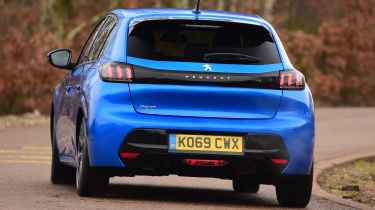Peugeot 208 hatchback - Engines, drive & performance
“The latest Peugeot 208 is light and agile but the steering lacks feel”
Sitting on all-new underpinnings when it launched in 2019, the Peugeot 208 is almost as fresh as new cars come and was future-proofed to accept fully electric propulsion. It’s an impressive feat of packaging and engineering, and the 208 is around 30kg lighter than its predecessor.
Sadly that hasn’t translated into a great driving experience; it’s not bad by any stretch, but the 208’s shortcomings make you realise just how good the now-discontinued Ford Fiesta is in this department. The Peugeot’s slightly firmer than the Renault Clio, making it a bit more agile but a touch less relaxed on the motorway.
The 208’s steering is light and has very little feel, while the small steering wheel can sometimes feel odd around town. Its size and shape take some getting used to, and you can occasionally lose track of where the front wheels are pointing. Rear visibility can also be a bit restrictive, both over your shoulder and out of the small rear windscreen. The eight-speed automatic gearbox has been improved and now shifts gears very quietly, while the manual still feels a bit rubbery.
Diesel models
Peugeot is still offering one diesel in the 208 – at least for now – despite the fuel's decline in popularity of late, and it could appeal if you spend lots of time on the motorway. At 1.5 litres in capacity and with four cylinders, the BlueHDi 100 is bigger than the petrol engine and has the most torque (250Nm vs 205Nm for the PureTech 100), getting it from 0-62mph in 10.2 seconds. It comes with a six-speed manual gearbox and should prove adept at overtaking and cruising.
|
Model |
Power |
0-62mph |
Top speed |
|
208 1.5 BlueHDi |
99bhp |
10.2s |
117mph |
Petrol models
The petrol choice is fairly straightforward: the same 1.2-litre PureTech three-cylinder engine comes in 75, 100 or 130 guises. They're named roughly in line with the power they offer; the entry-level 75 model gets 74bhp and takes 14.9 seconds to get from 0-62mph, and is only available in the most basic 208 model. It also has almost half the pulling power of the 100 version, so we’d avoid it unless you’re on a really tight budget.
More reviews
This 99bhp model also gets a six-speed manual gearbox instead of a five-speed, making it more flexible for motorway cruising. Its extra power and grunt should make it feel much more lively, as attested by a brisk 9.9-second 0-62mph dash. In back-to-back testing it proved quicker than the equivalent Renault Clio, if slightly less refined. It’s also possible to fit the PureTech 100 with an eight-speed automatic gearbox, but this has a negative effect on the car’s 0-62mph time.
The range-topping PureTech 130 model has a punchy 129bhp, cutting its 0-62mph time to just 8.7 seconds, which is 0.3 seconds faster than a Ford Fiesta EcoBoost with 138bhp. It comes with Peugeot’s eight-speed automatic as standard and is a brilliant engine. It has very little lag for a turbocharged engine, the rev needle zips around to the redline and it makes a cultured noise too.
When the new Peugeot 208 arrives from October 2023, Peugeot will offer two new mild-hybrid engines: the Hybrid 100 and Hybrid 136. Performance figures haven't been revealed, but the brand has said they'll benefit from increased torque thanks to the added electric motor. We’ll report back on what these models are like to drive as soon as possible.
|
Model |
Power |
0-62mph |
Top speed |
|
208 1.2 PureTech 75 |
74bhp |
14.9s |
106mph |
|
208 1.2 PureTech 100 |
99bhp |
9.9s |
117mph |
|
208 1.2 PureTech 130 |
129bhp |
8.7s |
129mph |
Electric models
For the first time in Peugeot's history, the 208 launched with the option of a fully electric powertrain alongside petrol and diesel engines. Badged the Peugeot e-208, it’s fitted with a 50kWh lithium-ion battery pack and a 134bhp electric motor, so not only is it the most efficient version, it’s also the most powerful. It can get from 0-62mph in 8.1 seconds, with a single-speed gearbox making for uninterrupted progress. We also have an in-depth review of the Peugeot e-208 for more information on the electric supermini.













